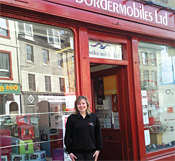
Mobiles in the Borders
 |
Nestled in The town of Hawick, which for those not in the know is pronounced ‘Hoik’, Border Mobiles is a small yet strong business that dominates its local area in the beautiful Scottish Borders. Chris Mayers, who runs the business with her partner in the picturesque town, explains the benefits of being a true local business.
Mayers has worked in the mobile industry for 15 years. She started her own business, Border Mobiles, five years ago after she decided she was ready to break out on her own. Previously she had been working for another independent dealer in her home town of Hawick, but that company went out of business 18 months after she left, leaving Mayers to supply the town and
surrounding areas with everything they need in mobile telecoms.
She comments: “Mine is the only mobile shop in town. I didn’t really have any problems setting up here; I’ve lived here for 20 years, but I’m originally from Liverpool. Most people in town know me.”
The only mistake Mayers made when she began her business was trying to be overly helpful to customers, trying to fix broken phones for instance, which meant she found herself being distracted from actually selling handsets in her bid to do as much as she could for her new clients. However, she soon gained a balance between being the mobile expert of the town, and keeping her business moving forwards with a strong focus on what she was there to do; sell phones.
Mayers continues: “The most important thing for me as a dealer in a small town is to be there for my customers, offering a reliable, friendly service. I know most of my customers, and it’s vital to be there for them when they need you. I try to treat people the way I like to be treated.”
Hawick is, Mayers says, in the middle of nowhere, surrounded by sheep. The town is 60 miles from anywhere, anywhere being Edinburgh if you head north, Newcastle to the south east and Carlisle to the south west. It has a strong farming community and is a thriving small town with a population of around 15,000. As such, Mayers’ main customers are consumers, with the local small business community and farmers making up no more than 10% of the client base.
Mayers’ business grew quickly from the word go and since has remained fairly static, she says. “I get regular customers, and I get the kids when they come out of school; I have two kids myself, one still at High School, so I get all their friends as customers as well!”
In terms of what she sells for businesses, which tend to be sole traders in her community, the focus is on basic handsets that do what they say on the tin. Impressive functionality is not required, Mayers comments. While for the farming contingent, hard wearing handsets are extremely popular, such as the JCB Tough Phone, Samsung Solid M110 and Bound B2700, and Sony Ericsson C702.
On smartphones, demand is low as is knowledge of them, Mayers says. She states: “I don’t sell many smartphones. Some people are slow to pick up on what’s new; last Christmas locals here were finally starting to pick up on the fact there’s something called an iPhone out there! I would love to offer them the iPhone, but as an independent I can’t, which is restrictive for me and for my customers.”
On being an independent dealer, Mayers says she would like to see the commission structures offered by operators changed. She says: “If I sell a product, I don’t mind loosing my profit if someone doesn’t pay, but I do care about loosing my stock as well. Operators should say something like, here’s £200 for a connection; 20% of that is for the handset. I’d also like to see operators give ongoing commissions on consumers as well. I see a lot of high spending consumers out there, and if ongoing commission structures went across the board we’d get a chance to get extra revenue from them.”
SIM-only deals are becoming increasingly popular however, says Mayers. “Due to the current climate, people are interested in SIM-only, where they don’t have to take anything on contract but they get the value. The town itself has seen quite a few places close down due to the recession, which doesn’t help people. Because people can see evidence of the recession, they aren’t looking to replace devices with the most expensive handset. I get a lot of people coming in asking for a basic handset.”
Over the next six months, Mayers is focusing on keeping her business going. “I operate day by day,” she explains. “As customers come through the door I find out what they need and I sell it to them. We’re lucky because with just the two of us running the business, we have very minimal overheads.”
